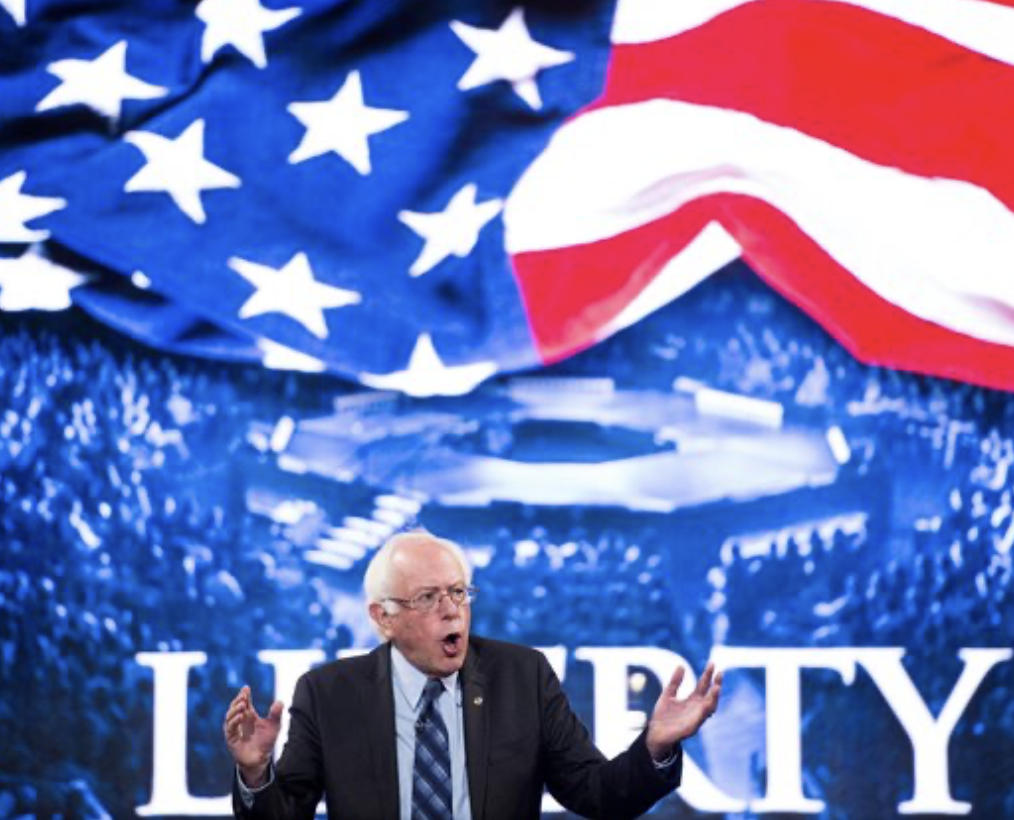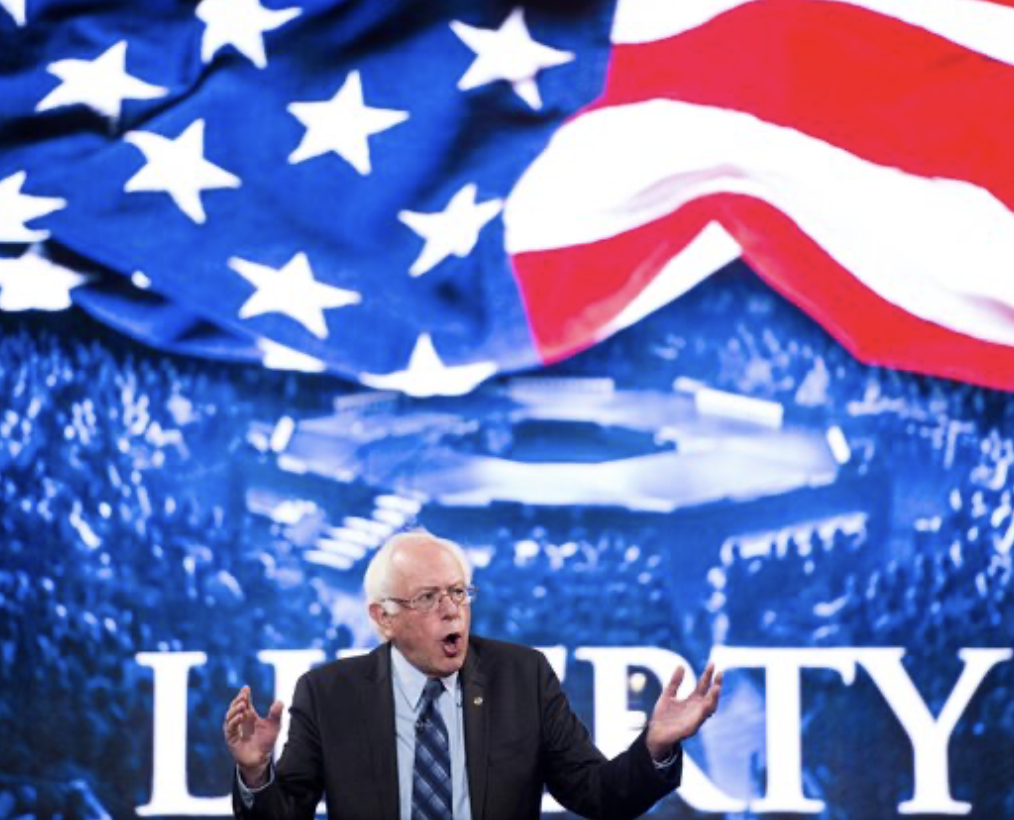
ORIGINALLY PUBLISHED ON THE NOW DEFUNCT BERNIEBLOG.ORG.
On Monday, September 14, 2015, Senator Bernie Sanders spoke to the students of Jerry Falwell’s Liberty University in Lynchburg, Virginia, a stalwart conservative Republican soapbox since Reagan’s speech in October, 1980. Make no mistake: this is a monumental event and one that exemplifies the “Bernie brand” for the uninitiated masses.
Here’s why:
In the late 1970s, the New Right, concerned primarily with fiscal conservatism, combined Goldwater’s laissez-faire economic philosophy with the Chuck Colson/Nixon race-baiting “Southern Strategy” by focusing on contentious social issues to generate voting blocs of single-issue voters within the Republican Party (crime, abortion, welfare, drugs, etc.). Less than a decade after founding Lynchburg Baptist College/Liberty University on the principles of burgeoning neoliberal economic policies and the developing social conservative brand (as well as providing segregation via a private school setting), Jerry Falwell unveiled his moderately successful Moral Majority, a lobbying effort heavily influenced by anti-abortion activist Francis Schaeffer and megachurch pastor (and later Left Behind series co-writer) Tim LaHaye. These and other figures helped to wed the New Right with conservative Fundamentalists and Evangelicals to form the pro-“free market”, pro-“family values”, pro-military “Christian Right” voting bloc within the Republican Party, firmly established by the 1980 party platform that promoted “maximum individual liberty” and an “individual’s right to privacy” along with support for a Constitutional amendment to ban abortion and opposition to federal enforcement of the Equal Rights Amendment for women.
As it turned out, of course, Reagan chose very few Evangelical appointees and ultimately disappointed the Christian Right by appointing pro-choice Sandra Day O’Connor to the Supreme Court, further alienating many Catholics and mainline Protestants by cutting social services and building up nuclear arms. This set the trend for future Republican candidates who would continually court the Christian Right vote, yet rarely offer political favors while in office. Even so, Falwell never wavered in his support of the President. And although many Republicans and conservative Christians continually distanced themselves from the Moral Majority (for instance, in a 1981 interview, Reverend Billy Graham warned against the mingling of politics and religion, saying, “The hard Right has no interest in religion except to manipulate it”), no Democratic Presidential candidate has since won a majority of the white Fundamentalist and Evangelical vote.
This small, influential bloc of dedicated voters was formed in part by the tactics of the New Right, the guidance of the Moral Majority and the influence of the Council for National Policy (CNP), established by Tim LaHaye, Paul Weyrich and Richard Viguerie. Of course this “story” is much longer, more complicated and reaches back further into history than the short narrative I’ve provided here: for instance, influence included think tanks like the Heritage Foundation (co-founded by Weyrich) and the John Birch Society (co-founded by Fred Koch, father of Charles and David Koch), the behind-the-scenes operations of such figures as Abram Vereide and Doug Coe of “The Fellowship”, the writings of Rousas John Rushdoony, the political connections of Gary Bauer (friend of Edgar Prince, father of Blackwater founder Erik Prince), and the collusion of politicians from both sides of the aisle to turn the campaign process into a dramatic moral struggle over a few standard issues, dramatized as a cosmic battle of good vs. evil. (For more information, see: Kevin Kruse, One Nation Under God: How Corporate America Invented Christian America; Daniel K. Williams, God’s Own Party: The Making of the Christian Right; Jeff Sharlet, The Family; Bill Ellis, Raising the Devil and Jeremy Scahill, Blackwater: The Rise of the World’s Most Powerful Mercenary Army).
Sanders’ audience was mostly university students and staff (who, according to a Liberty alumni, are not allowed to publicly contradict the university’s stance on social issues), with a smattering of local supporters. This history I’ve presented is just a taste of why PoliticusUSA would describe Bernie’s speech as going “into the lion’s den”: Liberty University is not merely a symbol of the collusion between neoliberal economic policy and theologically conservative Evangelicals and Fundamentalists. In 1971, Jerry Falwell founded Liberty as a segregationist private school in reaction to the civil rights movement, only to get caught up in a fight with the IRS over the issue of “freedom” when the Green v. Connally ruling mandated that tax-exempt private schools could not discriminate on the basis of race. The popularity of televangelism legitimized the Pentecostal undercurrents of Falwell’s theology for a mainstream audience, and he helped merge that spiritual morality with political conservatism in the Republican party, which, in turn, influenced Falwell and other televangelists to justify neoliberalism as a Biblical mandate. As a result, the late Falwell and Liberty University actively participated in a much broader effort to manufacture a closed-ideology voting bloc that has very little contact with the “outside world”, which, because of the influence of Pentecostalism, is often characterized by conservative Christian leaders as the abode of “secular liberalism”: a combination of pop culture, “multiculturalism”, “liberal politics” and foreign religions that make up Satan’s bid for world domination.
Now, in the 21st century, Republican presidential candidates like Ted Cruz still feel obligated to visit Liberty to gain their endorsement, which is highly influential among the closed voting bloc of the Christian Right remnant.
So why would Bernie, a Democratic Socialist and a Jew, even bother to speak at Liberty University? Who could Bernie possibly expect to listen to him? Is he just a “crazy old man” as the mainstream media attempts to portray him?
Quite the opposite, actually. Senator Bernie Sanders is simultaneously the most sincere and most politically savvy candidate running. He knew exactly what he was doing and only he could pull it off. In his own words, Bernie felt he needed to speak to a group of people typically perceived to be his enemies because, he said, “I believe that it is important for those with different views in our country to engage in civil discourse – not just to shout at each other or make fun of each other.” He pointed out that the gulf between the audience and himself on some social issues (such as abortion and gay marriage) was too great to traverse, but argued that there are other issues “of enormous consequence to our country and the world” that may provide common ground between them. He then laid out his policy platform, framed for this particular audience, in terms of the social injustice caused by economic disparity and our moral responsibility to address it.
In other words, he provided a model for speaking to people who disagree with us in a divided, politically volatile world: honesty, patience, empathy, compassion and common ground.He evoked the demand for social responsibility found in the Gospel of Matthew, what scholars call the “most Jewish” gospel because it actively addresses Levitican traditions which include mandates to take care of the poor, widows, children, foreigners and address the morality of debt relief. For instance, the Sermon on the Mount (Matthew 5-7) offers comfort to the suffering and recommends proper social behavior, while the parable of the sheep and the goats (Matthew 25:31-46) consigns to eternal punishment anyone who has not cared for the “least of these”: the poor, hungry and imprisoned.After a short explanation of why he was there, Sanders quoted Matthew 7:12 to demonstrate for the audience the core of his message, a common ethic he said was shared by all religions: “Do to others what you would have them do to you”.His words echoed Matthew 6:24 (“You cannot serve both God and mammon/money”) and the Pope’s recent condemnation of greed (“saying the poor are often sacrificed on the ‘altar of money’ and accusing the wealthy of worshipping a new ‘golden calf.'”), when he said, “Money and wealth should serve the people. The people should not serve money and wealth.”The student body praised Sanders for never speaking in rhetoric, never speaking down to them, and never disrespecting their beliefs. In the search for common ground, he embraced the Biblical mandate to take care of the “least” among us as something he and the Liberty University audience could share.He said, “When we talk about morality and when we talk about justice, we have to, in my view, understand that there is no justice when so few have so much and so many have so little. There is no justice when the top one-tenth of 1 percent today in America owns almost as much as all of the wealth at the bottom. …I would hope very much that as part of that discussion and part of that learning process, some of you will conclude that, if we are honest in striving to be a moral and just society, it is imperative that we have the courage to stand with the poor, to stand with working people and, when necessary, take on very powerful and wealthy people whose greed, in my view, is doing this country enormous harm.”Sanders’ words have a very important history among Christians in the Americas, in the Social Gospel movement (influenced by Matthew 6:10) which influenced the early Progressive movement and Liberation theology (often based on Matthew 10:34 as a call to enforce justice in the world), which informs the current Pope. Of course, his own Democratic Socialism draws from the early 20th century Progressive era and Keynesian economics, the model that shaped U.S. economic policy prior to Reagan.Sanders’ Presidential run and his speech at Liberty University are well-timed. Currently, the mainstream media increasingly has to contend with the obvious global rise in progressive politics among millennials and there is a resurgent rise of young Evangelicals and “spiritual-but-not-religious” youth who grew up in churches that could not reconcile the words of Jesus with neoliberal policies promoted by the Christian Right. Disenchanted by the empty promises of “trickle down economics” policies like “free trade” and “free markets” that devastate the working classes, many Christians and non-Christians alike are rebelling against the ideologies they have inherited in search of a moral core not often found in American churches the last few decades.As one pastor, a Liberty University alumni, put it, Bernie Sanders speaking at Liberty was like John the Baptist, “crying out to the religious leaders, the Pharisees of his day, calling them corrupt and complicit with those who have all the power and all the money and all the wealth, and abandoning the people that God loves, that God cares about…lightning hit my heart at that moment. And I realized that we are evangelical Christians. We believe the Bible. We believe in Jesus. We absolutely shun those who would attempt to find nuance and twisted and tortured interpretations of scripture that they would use to master all other broader interpretations, to find some kind of big message that they want to flout. We absolutely scorn such things, and yet somehow we commit to the mental gymnastics necessary that allows us to abandon the least of these, to abandon the poor, to abandon the immigrants, to abandon those who are in prison.”Hopefully, Bernie’s hoarse voice of righteousness will not be relegated to the barren wilderness for much longer. His message, paralleled in the Gospel of Matthew, is something the whole world needs to hear.
Again, for the first time.

Leave a comment